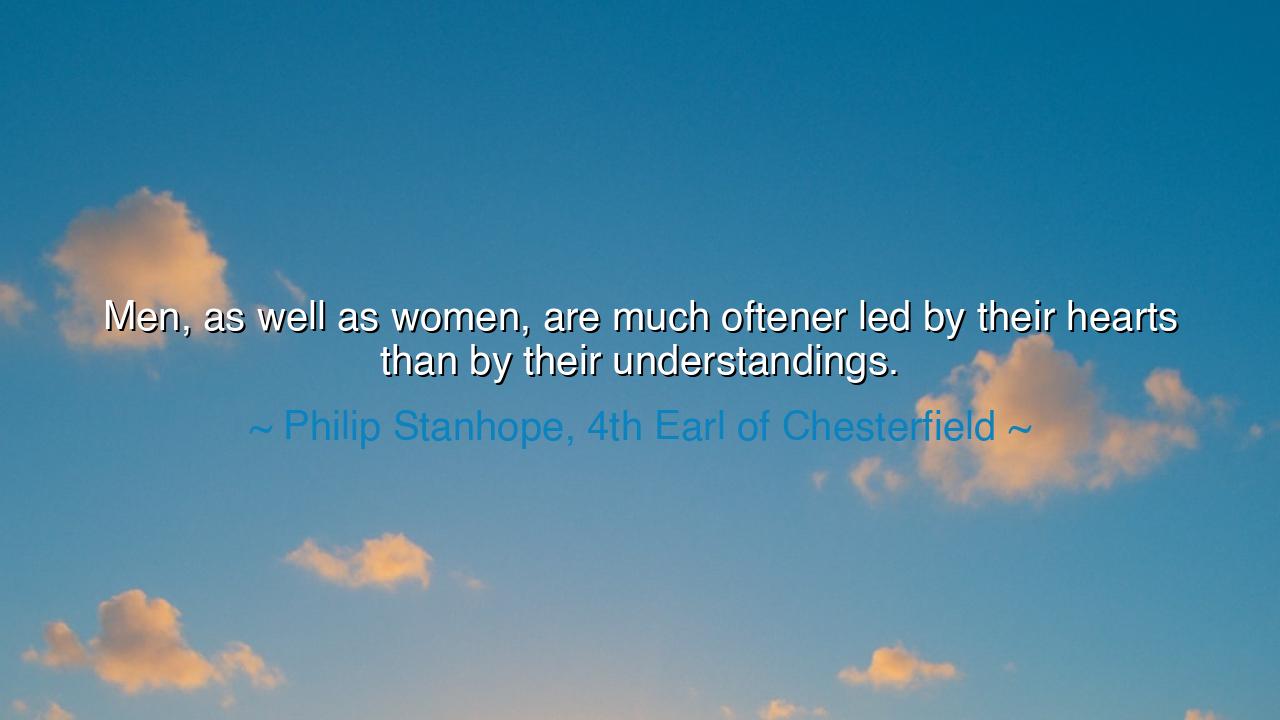
Men, as well as women, are much oftener led by their hearts than
Men, as well as women, are much oftener led by their hearts than by their understandings.






The words of Philip Stanhope, 4th Earl of Chesterfield, “Men, as well as women, are much oftener led by their hearts than by their understandings,” flow like a calm river of observation, yet beneath their surface runs the deep current of human truth. They remind us that reason, though exalted as man’s greatest gift, is often the servant of emotion. Chesterfield, known in his time as a man of intellect, diplomacy, and wit, understood well the contradictions within the human spirit. His wisdom came not from cold philosophy, but from life’s stage itself—where men of logic and power, despite all their learning, were still swayed by love, pride, envy, or ambition. In this line, he strips away the illusion of rational mastery and reveals that heart, not mind, governs much of human conduct.
In the eighteenth century, when this thought was written, society prided itself on refinement and reason. It was the Age of Enlightenment, when men believed they had ascended beyond passion into pure intellect. Yet Chesterfield, ever the realist, saw through this noble pretense. He knew that beneath the powdered wigs and polished manners, the same ancient forces still ruled. The philosopher and the poet, the general and the lover—all bowed, in the end, before the emotions that define humanity. His words remind us that even in an age of intellect, feeling triumphs over reason, for man’s understanding may guide his steps, but his heart determines where he walks.
Throughout history, we see this truth unfold like a recurring drama. Consider the tale of Mark Antony and Cleopatra, two rulers whose empires trembled beneath the weight of their love. Antony, a Roman general of unmatched discipline, conquered nations but could not conquer his own heart. His understanding told him that his loyalty belonged to Rome, yet his passion for Cleopatra bound him to Egypt and to ruin. His mind saw the peril, but his heart defied it—and in that defiance, he became both tragic and immortal. Thus Chesterfield’s wisdom finds its reflection in history: reason builds empires, but emotion destroys—or redeems—them.
The same truth reveals itself not only in love but in every pursuit of life. Men go to war not merely because of strategy, but because of anger, pride, or honor. They devote themselves to causes, religions, and nations not from calculation, but from faith and feeling. Even in the chambers of science or politics, emotion stirs beneath the surface. A statesman may speak of justice, but what drives him is conviction. A scholar may pursue knowledge, but it is curiosity and wonder, not cold reason, that sustains him through endless nights of study. Thus, it is not weakness to be ruled by the heart—it is the very essence of being human.
Yet Chesterfield’s tone carries not praise, but caution. To be led by the heart too much is to walk blindly; to be guided only by the mind is to walk lifelessly. The ancients taught that virtue lies in balance, and here that wisdom holds true. Reason must shape emotion as the potter shapes clay, giving form to its passion without extinguishing its fire. To follow the heart is noble, but to do so without wisdom is perilous. The task of the wise, therefore, is not to silence feeling, but to discipline it, so that love becomes loyalty, and courage does not descend into recklessness.
In this, we find an echo of the Stoics, who sought mastery over emotion but never its destruction. Seneca wrote that anger is the briefest madness, yet he also knew that without passion, no great deed is born. Chesterfield’s insight bridges this same divide—acknowledging that though man prides himself on intellect, it is emotion that gives his life color, purpose, and tragedy. Without it, he would be a machine, not a man. Thus, the heart leads more often because it dares more often. The mind weighs; the heart leaps. And in that leap, humanity reveals both its greatest strength and its fatal flaw.
So let this teaching be passed down: know thy heart, but never be its prisoner. Let emotion be your servant, not your master. When love calls, listen; when anger burns, pause; when pride swells, remember humility. The heart is a mighty chariot—beautiful but wild—and only when guided by the reins of reason does it lead to greatness. For as Chesterfield teaches, both men and women are led by their hearts, yet it is the wise who learn to steer the heart with understanding, turning passion into purpose, and desire into destiny.






AAdministratorAdministrator
Welcome, honored guests. Please leave a comment, we will respond soon